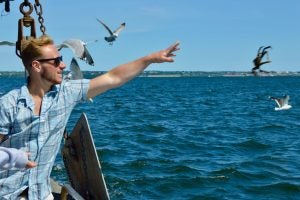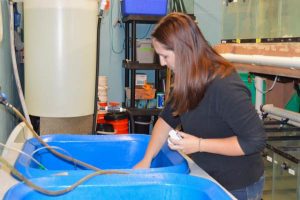
What do oysters, sea squirts and algae have in common? Each is a focus of study by students participating in the 2017 Summer Undergraduate Research Fellows (SURF) program.
Since 2007, undergraduate students from across Rhode Island have spent 10 weeks with the Rhode Island National Science Foundation’s Established Program to Stimulate Competitive Research (RI EPSCoR) immersed in hands-on research opportunities. Students work alongside faculty mentors investigating topics that range from virus-host interactions to coral reef restoration and harmful algal blooms. The fellows conduct research on the water, in the field and in the lab during full-time, paid internships and present their findings at a late summer conference hosted by URI.

Danielle Jordan, a marine biology major in the College of the Environment and Life Sciences (CELS) and one of two-dozen 2017 RI EPSCoR fellows, knows her way around the Blount aquaculture lab at the URI Graduate School of Oceanography. She empties tanks of water and rinses them out as she explains her work on a project examining how disease-defense strategies influence productivity of farm-raised oysters. Her mentor is Tal Ben-Horin — a post-doctoral researcher at the College.
Jordan, who has wanted to be a marine biologist since her father took her to an aquarium when she was two, relished the immersion the program provides. “SURF offered a new opportunity to frame my own research experience,” she said.
The highly competitive program is the result of a collaboration between the Rhode Island IDeA Network of Biomedical Research Excellence and RI EPSCoR, federally funded enterprises based at URI. More than 300 students have taken part in the RI EPSCoR SURF program since its inception, including 100 from URI. The program also has engaged more than three dozen URI faculty mentors, some of whom continue to work with students after summer ends.
Evelyn Siler, a cell and molecular biology major, spent her summer in the lab of Steven Irvine, associate professor of biological sciences, helping to investigate how Ciona intestinalis, or sea squirts, cope with the impacts of climate change.
Siler, who arrived at URI planning to study business before she discovered a love of science, said being able to conduct research as an undergraduate helped confirm her career path: “The hands-on component is super important,” she said.
At Rhode Island’s Greenwich Bay, marine biology major Evan Ernst throws on waders or pulls on a wetsuit to collect samples of sea lettuce while investigating macro-algal species and factors that contribute to their growth, which can cause harmful algal blooms. He is working in the lab of Professor Carol Thornber, CELS interim associate dean of research.
SURF has solidified Ernst’s love of research: “I really like the process of discovery,” he said. “There are so many questions to be asked.”
- With photography, reporting and writing by Amy Dunkle, Rhode Island National Science Foundation/ Established Program to Stimulate Competitive Research.
